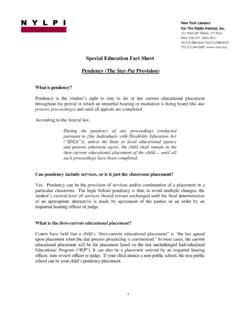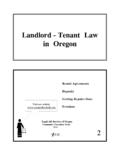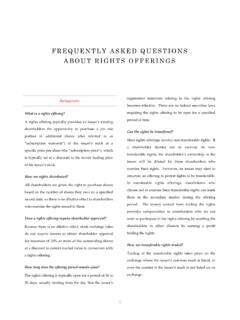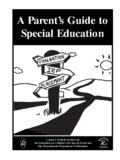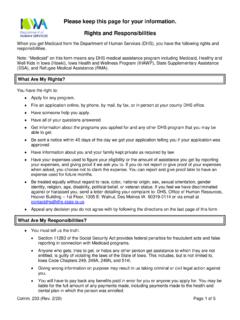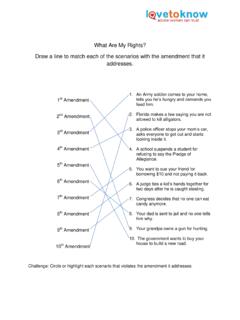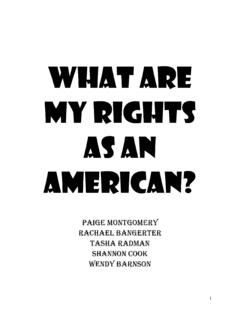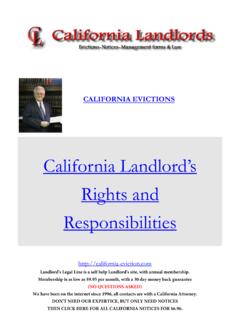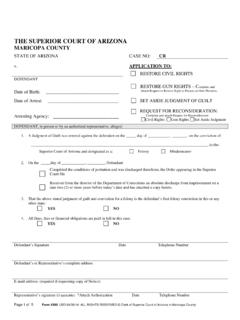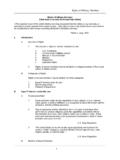Transcription of HAT ARE MY RIGHTS - Justice through community …
1 NYLPI DISABILITY Justice FACT SHEET HOUSING RIGHTS OF PEOPLE WITH DISABILITIES IN NEW YORK CITY REQUESTING REASONABLE ACCOMMODATIONS IN PRIVATE AND PUBLIC HOUSING 1 what ARE MY RIGHTS ? If you are a person with a physical or mental disability, your housing provider is not allowed to discriminate against you because of your disability. Housing providers include: landlords, housing authorities, co-op boards, and condo associations. Federal, state and city laws forbid housing providers from: Refusing to rent or sell you an apartment because of your disability. Singling you out and treating you less favorably because of your disability. Refusing to make reasonable changes that you need because of your disability. This fact sheet focuses on your right to request reasonable changes, called reasonable accommodations, and what you can do if your housing provider says no. what IS A REASONABLE ACCOMMODATION?
2 A reasonable accommodation is a reasonable change that a person with a disability needs to equally use and enjoy her home. A reasonable accommodation can be a reasonable adjustment or exception to a housing provider s policy or procedure, or a reasonable change to the way housing services are delivered. A reasonable accommodation can also be a reasonable structural change to the physical space inside an apartment unit, or to the common areas of an apartment building. Examples of reasonable accommodations may include: Making an exception to a no pets policy to allow a service animal Assigning a mobility impaired resident a parking space near the building s entrance Providing a sign language interpreter during housing provider meetings Installing grab bars in the bathroom Moving a resident with a physical disability to a lower floor if the building has no elevator Sending a second copy of a rent bill to a social worker Housing authority allowing extra time to gather documents Installing a ramp and/or automatic doors at the building s front entrance.
3 what DOES REASONABLE MEAN? Housing providers are only required to make reasonable changes that relate to your specific disability. The reasonableness of a request takes into account several factors, such as: the cost of the 2 THIS FACT SHEET GIVES ONLY GENERAL INFORMATION; IT IS NOT LEGAL ADVICE change, the housing provider s financial resources, the ease/difficulty of making the change, the benefit of the change to you, and the effect the change would have on others. Each situation is unique. Housing providers can refuse to make changes that: Would cost an extremely large amount of money or cause extreme difficulty Would fundamentally change the nature of the housing program Would not be structurally possible Do not address a disability-related need Would directly harm other people HOW DO I REQUEST A REASONABLE ACCOMMODATION? You can make a request to your housing provider at any time, verbally or in writing.
4 You don t have to use the technical words reasonable accommodation as long as the request communicates that you are requesting a change because of a disability-related need. It s usually best to put requests for reasonable accommodations in writing. Write a letter informing your housing provider that you are a resident with a disability who needs a reasonable accommodation, Be specific about what you need changed and the reason you need it, Send the letter by certified mail, return receipt requested, and Keep a copy for your records. It can be helpful to support your request with a letter from your healthcare provider. You do not need to reveal your medical diagnosis or release your medical records. Your housing provider is allowed to request medical documentation to confirm 2 things: (1) you really do have a disability, and (2) your specific accommodation request directly addresses a disability-related need.
5 If your need for an accommodation is obvious, then your housing provider shouldn t request documentation. Ask your healthcare provider to write a letter that addresses the following: 1. States the physician s credentials and qualifications. 2. States how long the physician has treated you and when he/she last examined you. 3. Verifies that you have a physical or mental impairment that substantially limits one or more major life activities, and specifically identifies which major life activity your impairment limits. ( seeing, hearing, walking, standing, bending, thinking, learning, communicating, performing manual tasks, caring for yourself, etc). 3 THIS FACT SHEET GIVES ONLY GENERAL INFORMATION; IT IS NOT LEGAL ADVICE 4. Describes in detail why the requested change is necessary to give you the equal opportunity to use and enjoy your home. It is very important to explain the connection between the requested accommodation and the major life activity your disability limits (identified above in number 3).
6 CAN I ALWAYS GET THE ACCOMMODATION I REQUESTED? Your housing provider is allowed to offer you a different accommodation than the one you thought of, as long as the alternative also meets your disability needs. For example, a landlord can offer to move a tenant with a physical disability to a building that already has a ramp, instead of building a ramp at the tenant s current building. (Depending on the unique facts of each situation, an apartment exchange may or may not be a reasonable alternative). If you refuse a reasonable alternative proposed by the housing provider, they may not be required to make further efforts to accommodate you. WHO PAYS FOR A REASONABLE ACCOMMODATION? Housing providers are required to pay the cost related to reasonable changes to policies and procedures, and reasonable changes to the way services are delivered. Determining who pays for reasonable structural changes is not as clear-cut.
7 But, in New York City, housing providers are often also responsible for the cost of reasonable structural changes. Since several factors and laws are involved in determining whether a specific request is reasonable and whether your housing provider is responsible for the cost, it is recommended that you consult with an attorney for an individualized assessment. WHICH LAW PROTECTS ME? There are five anti-discrimination laws that most frequently impact the housing RIGHTS of people with disabilities in New York City: the federal Fair Housing Act, the New York State Human RIGHTS Law, the New York City Human RIGHTS Law, the federal Rehabilitation Act and the federal Americans with Disabilities Act. The law(s) that apply to your housing situation will depend on whether you live in private or public housing, and the size of your building. Each law forbids disability discrimination, but the laws are not identical.
8 Depending on the type of reasonable accommodation you need, it is possible that one law may be more beneficial to you than another. If you want to figure out which law best applies to your housing situation, consult with an attorney for an individualized assessment. what CAN I DO IF MY HOUSING PROVIDER DENIES MY REQUEST? Sometimes, housing providers and residents cannot agree on what change or cost is reasonable. If your housing provider denies your request, or takes too long to respond, there are generally two ways to make a formal complaint. You can: (1) file an administrative complaint with a governmental agency, or (2) file a lawsuit in court. Typically, administrative complaints take less time than lawsuits. Some people who don t have lawyers also find that the administrative procedures are easier to navigate than the court procedures. When choosing where to file, you should also be aware that there can be differences in the kind of relief you can get, and different filing deadlines.
9 4 THIS FACT SHEET GIVES ONLY GENERAL INFORMATION; IT IS NOT LEGAL ADVICE what CAN I DO IF I THINK MY LANDLORD IS DISCRIMINATING AGAINST ME? Talk to one of NYLPI s disability RIGHTS advocates or lawyers to find out whether your RIGHTS have been violated. You may call our intake line at (212) 244-4664 on Mondays and Fridays between 9:30AM and 1:30PM, and on Wednesdays between 1:30PM and 5:30PM. For additional information on your RIGHTS or to file an administrative discrimination complaint you can contact the following government agencies: Department of Housing and Urban Development 26 Federal Plaza, Room 3532 New York, New York 10278-0068 Phone: (212) 542-7519/ TDD: (212) 264-0927 Complaints based on a violation of the FHA can be filed with HUD within 1 year of the alleged discriminatory act. New York State Division of Human RIGHTS One Fordham Plaza, 4th Floor Bronx, New York 10458 Phone: (718) 741-8400/ TDD: (718) 741-8300 Complaints based on a violation of the State HRL can be filed with the New York State Division of Human RIGHTS within 1 year of the alleged discriminatory act.
10 A person can also cross-file the complaint with HUD to allege a violation of the FHA at the same time. New York City Commission on Human RIGHTS 40 Rector Street, 10th Floor New York, NY 10006 Phone: (212) 306-7450/ TDD: (212) 306-7686 Complaints based on a violation of the City HRL can be filed with the New York City Commission on Human RIGHTS within 1 year of the alleged discriminatory act.
